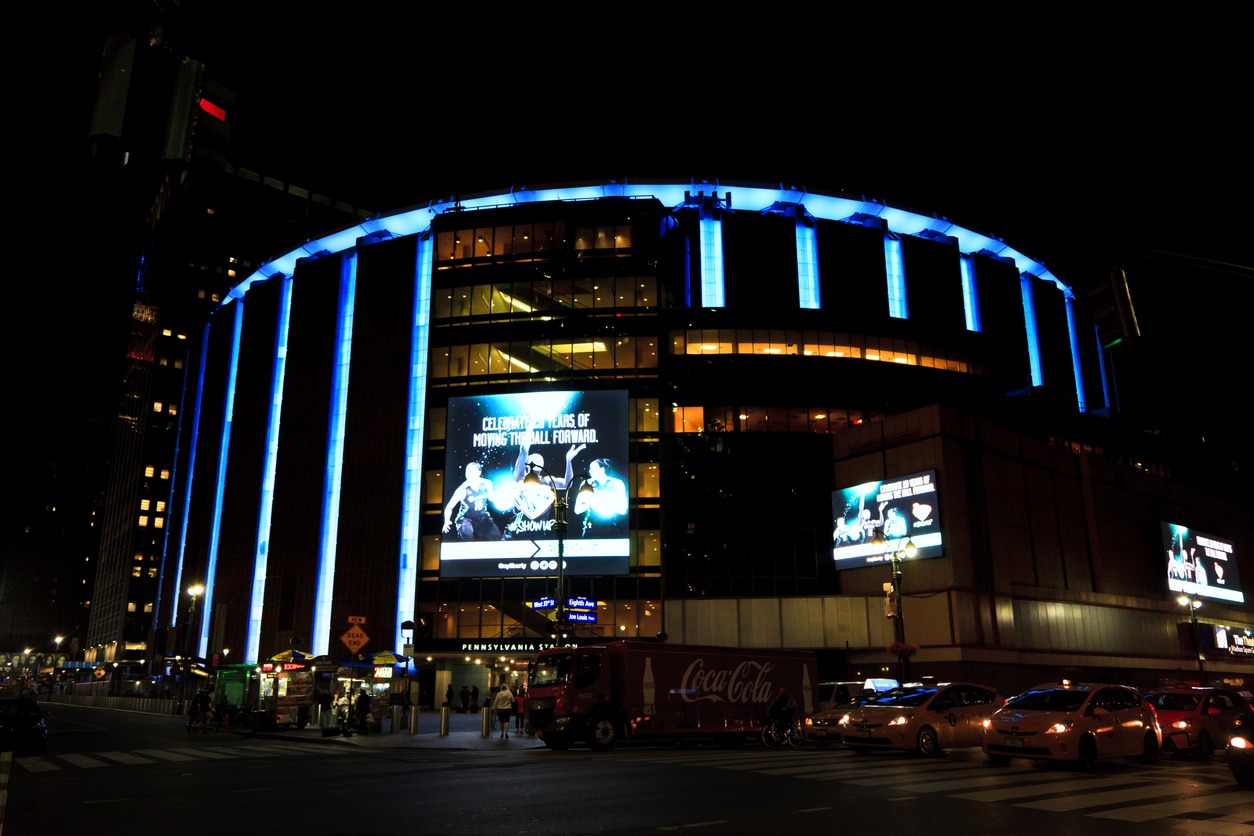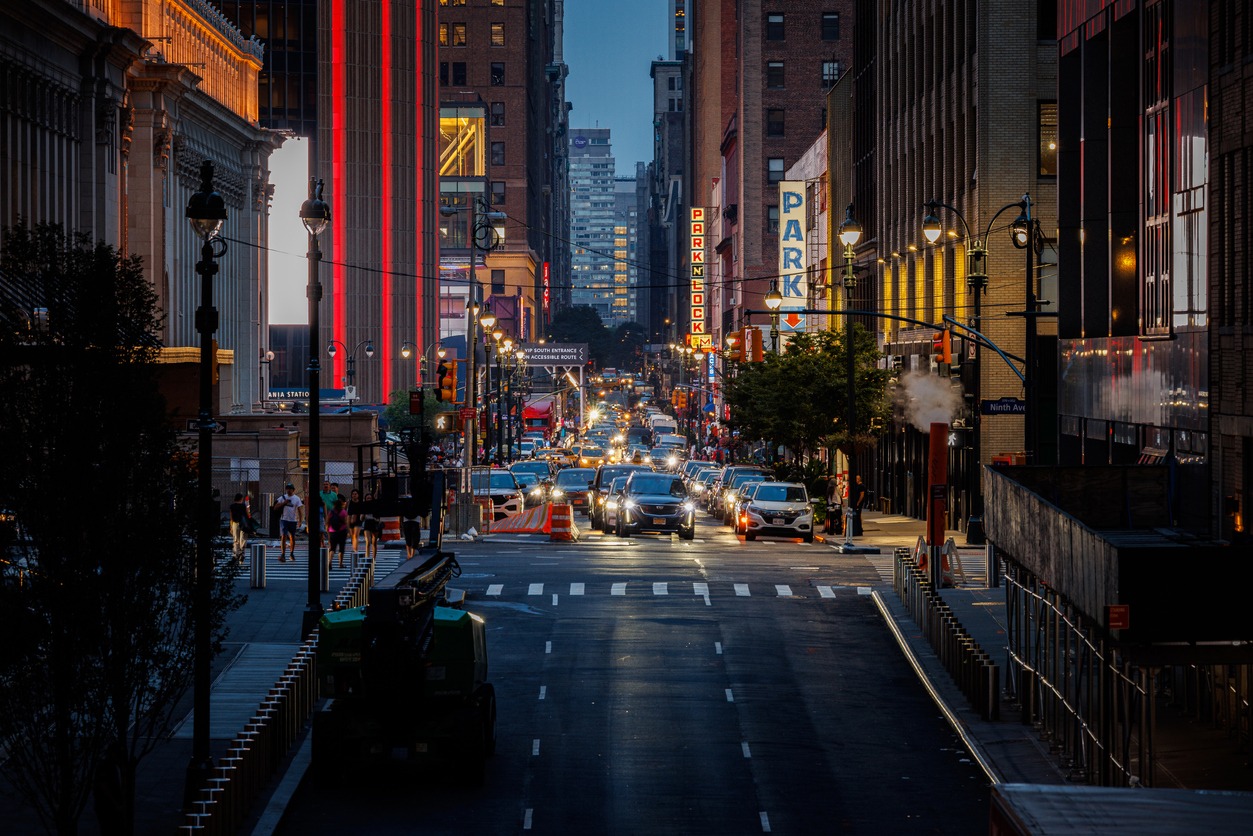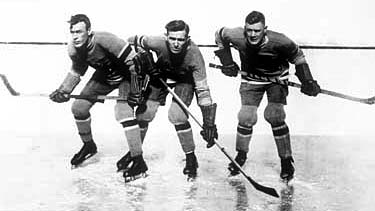Madison Square Garden, affectionately known as “The Garden,” stands as an iconic landmark in the heart of New York City. This legendary arena has been more than just a venue for sports; it has been a central hub for cultural and social gatherings, making a profound impact on the city’s sports scene and beyond. This blog post delves into the rich history of Madison Square Garden, its influence on New York City sports, and how it has become an irreplaceable part of the city’s fabric.
The Historical Significance of Madison Square Garden
Madison Square Garden has a storied past, with its origins dating back to 1879. The current structure, however, is the fourth incarnation of the arena and opened its doors on February 11, 1968. Located atop Pennsylvania Station, between 7th and 8th Avenues from 31st to 33rd Street, this version of The Garden was designed by architect Charles Luckman and has become the oldest major sporting facility in the New York metropolitan area.
Over the decades, The Garden has hosted a myriad of events, from historic boxing matches, such as the “Fight of the Century” between Joe Frazier and Muhammad Ali in 1971, to landmark political and cultural gatherings. However, its most enduring legacy is intertwined with the world of sports, serving as the home ground for the New York Knicks (NBA) and the New York Rangers (NHL), among other teams.
The Garden’s Influence on NYC Sports
Madison Square Garden’s impact on New York City’s sports culture is profound and multifaceted. The arena, often referred to as “The World’s Most Famous Arena,” has cultivated an atmosphere that is both electrifying and intimidating. Its central location in Manhattan, coupled with the storied history of the events it has hosted, contributes to a unique environment where athletes and fans alike feel the weight and excitement of competing in such a historic venue.
Basketball and The Knicks
Madison Square Garden and the New York Knicks share a symbiotic relationship, with the fortunes of one often reflecting on the other. During the early 1970s, The Garden was the epicenter of basketball excellence when the Knicks secured their NBA Championships in 1970 and 1973. These victories were not just triumphs of sportsmanship but also moments of communal pride, bringing the city together in celebration.
The legends who have played for the Knicks, like Willis Reed’s heroic Game 7 appearance in the 1970 NBA Finals, Walt “Clyde” Frazier’s masterful performances, and Patrick Ewing’s dominance in the paint, have all contributed to the rich tapestry of The Garden’s history. These players didn’t just showcase their skills; they became part of the city’s identity, embodying the resilience and spirit of New York.
Hockey and The Rangers
Hockey at Madison Square Garden has its own storied history, with the New York Rangers calling The Garden home. The Rangers’ 1994 Stanley Cup victory is a landmark moment in the arena’s history, symbolizing the end of a long championship drought and igniting the city’s passion for hockey. The moment when Mark Messier lifted the Stanley Cup was not just a victory for the team but a triumphant chapter in The Garden’s legacy.
The Garden’s influence extends to the way it has hosted generations of hockey fans, creating traditions and memories that are passed down through families. The intimacy of the arena, where fans are close to the ice, allows for an immersive experience, making each game feel personal and intense.
Amplifying Other Sports
Beyond basketball and hockey, MSG has been instrumental in elevating other sports within the city. The arena has hosted a variety of sporting events, including college basketball, boxing, mixed martial arts (MMA), wrestling, and even e-sports. Each event brings its own flavor and fan base to The Garden, contributing to the diverse sports culture of New York City.
College Basketball
MSG is considered a mecca for college basketball, hosting the annual Big East Conference Tournament and numerous other high-profile college games. This has helped nurture a strong college basketball following in the city, providing a national stage for emerging talent.
The Unique Position of Madison Garden In New York City’s Sports Culture
Madison Square Garden’s unique position within New York City’s sports culture is not just a matter of geography or history, but a reflection of its enduring influence on the city’s identity and the collective psyche of its inhabitants. Situated in the heart of Manhattan, MSG doesn’t just stand as an architectural marvel; it embodies the hopes, dreams, and passions of sports enthusiasts and athletes alike.
- A Melting Pot of Sporting Traditions: Madison Square Garden serves as the epicenter for a diverse array of sporting traditions, reflecting the multicultural tapestry of New York City itself. From the fast-paced action of NBA games to the strategic battles on NHL ice, The Garden hosts an array of events that cater to varied tastes and interests. This diversity extends to college basketball tournaments, boxing matches, and even non-traditional sports events, making The Garden a microcosm of the world’s sporting culture.
- Iconic Moments and Memories: The Garden has been the backdrop for countless iconic moments in sports history. It’s where Willis Reed limped onto the court to inspire the Knicks in the NBA Finals, where Mark Messier led the Rangers to break a 54-year Stanley Cup drought, and where countless boxers have faced their ultimate tests. These moments are etched into the collective memory of New Yorkers, making MSG a repository of shared experiences that transcend generations.
- The Intangible Atmosphere: There’s an intangible quality to the atmosphere in Madison Square Garden that sets it apart from other venues. Perhaps it’s the proximity of the fans to the action, the acoustics that amplify every cheer, or the history seeping from its walls—whatever the reason, players and performers often speak of The Garden’s unique energy. This energy is palpable during games and events, creating an environment where historic performances seem not just possible but inevitable.
- A Stage for Stars to Shine: Madison Square Garden has a longstanding reputation as a stage where stars are born and legacies are cemented. Athletes and performers alike dream of taking center stage at The Garden, knowing that a standout performance can elevate their status from mere talent to legend. This has made MSG a crucible for high-stakes drama, where athletes push their limits in the hopes of joining the pantheon of greats who’ve left their mark on its hallowed ground.
- Community and Identity: For many New Yorkers, Madison Square Garden is more than a venue; it’s a symbol of resilience, ambition, and community. Attending an event at The Garden is a rite of passage, a communal experience that binds fans together in shared joy, disappointment, and hope. It’s where New Yorkers from all walks of life come together, united by their love for the game and their city.
- Facing Challenges and Evolving: Despite its storied past, Madison Square Garden faces the challenges of modernity and changing urban landscapes. Debates over its location and the future development of the surrounding area highlight the need for The Garden to evolve while maintaining its historic essence. This balancing act is crucial as The Garden seeks to remain a central hub for sports and entertainment in an ever-changing city.
Navigating Challenges and Controversies
Madison Square Garden (MSG), an emblematic beacon of sports and entertainment in New York City, is currently navigating a complex web of challenges and controversies that resonate far beyond its iconic facade. Central to these challenges is the contentious debate over its prime location above Penn Station, which, while historically significant, presents logistical constraints that hinder the station’s much-needed expansion and modernization efforts. This situation is further complicated by MSG’s temporary operating permit, stirring discussions about potential relocation to rejuvenate the surrounding urban landscape.
Moreover, MSG faces an intricate legal and regulatory landscape, marked by zoning and permitting hurdles that can stall renovation projects, alongside litigation and compliance issues that span safety, health, and accessibility standards. These multifaceted challenges not only impact the operational aspects of MSG but also have wider implications for New York City’s sports scene, local economy, and community relations. Enhancing accessibility to MSG could vastly improve the fan experience, while the economic ripple effects of legal and regulatory obstacles extend to local businesses and the city’s tourism sector.
Furthermore, the manner in which MSG addresses these issues will play a crucial role in shaping its relationship with the New York Community, balancing the preservation of its rich heritage with the imperative for urban progress and innovation. As such, the ongoing saga of MSG encapsulates a broader narrative about the evolution of urban spaces in major cities, embodying the delicate interplay between tradition, modernity, and community engagement in the heart of New York City.
The Future of Madison Square Garden and NYC Sports
Madison Square Garden (MSG) stands at the crossroads of tradition and innovation, playing a pivotal role in shaping the future of New York City’s sports landscape. As we look ahead, several developments and trends hint at how MSG will continue to influence and be influenced by the evolving dynamics of the city and the sports world.
Proposed Developments and Renovations for MSG
MSG has undergone numerous transformations since its inception, each iteration reflecting the changing times and technological advancements. The most recent proposals for development and renovation of The Garden aim to enhance the fan experience, incorporate cutting-edge technology, and address the modern needs of athletes and performers.
- Technological Upgrades: Future renovations might include state-of-the-art audiovisual systems, augmented reality experiences for fans, and advanced analytics and technology for teams and athletes, enhancing performance and audience engagement.
- Sustainability Initiatives: As environmental concerns become more pressing, MSG is likely to adopt greener practices, from energy-efficient lighting and HVAC systems to sustainable materials and waste management practices, setting a standard for eco-friendly sports venues.
- Fan Experience Enhancements: Recognizing the evolving expectations of fans, MSG might introduce more interactive and personalized experiences, from advanced mobile app integrations that offer in-seat ordering and game insights to virtual reality zones that bring fans closer to the action.
- Infrastructure Improvements: With the ongoing discussions about the future of Penn Station, any major renovation or redevelopment of MSG will likely include significant infrastructure improvements aimed at enhancing accessibility, crowd flow, and integration with the city’s transportation network.
Emerging Sports and Events at MSG
MSG has always been at the forefront of embracing new sports and entertainment trends, and this is expected to continue as new sports gain popularity and traditional ones evolve.
- E-Sports and Digital Competitions: With the rapid growth of e-sports, MSG could become a key venue for major gaming tournaments and events, attracting a younger, tech-savvy audience and opening up new revenue streams.
- Mixed Martial Arts (MMA) and Combat Sports: Following the legalization of professional MMA in New York State, MSG has hosted high-profile MMA events. This trend is likely to continue, with The Garden becoming a premier destination for combat sports.
- Interactive and Experiential Events: As audiences seek more immersive experiences, MSG might host a wider array of interactive sports events, blending technology and live action to create unique spectacles.

The Potential Long-Term Impact of MSG on Future Generations of NYC Sports
The legacy and future developments of MSG have a profound potential impact on future generations, shaping their experiences as fans, athletes, and members of the New York City community.
- Inspiring the Next Generation: The ongoing evolution of MSG as a state-of-the-art venue can inspire young athletes and fans, fostering a deep connection with sports and entertainment that lasts a lifetime.
- Economic and Social Contributions: MSG’s role as a major economic driver will continue, providing jobs, spurring local business growth, and contributing to the city’s economy. Socially, it will remain a gathering place where diverse communities come together, reinforcing the social fabric of the city.
- Cultural Impact: MSG’s ability to adapt and remain at the forefront of the sports and entertainment industries ensures its place in the cultural narrative of New York City. It will continue to be a symbol of ambition, resilience, and excellence for future generations.
- Global Sports Hub: As MSG hosts more international events, it will further establish New York City as a global sports hub, attracting talent, tourists, and global attention, thereby enriching the city’s international appeal and influence.
The future of Madison Square Garden is intrinsically linked to the future of sports and entertainment in New York City. Through strategic renovations, embracing emerging sports and events, and its enduring impact on generations, MSG is poised to remain an iconic venue that not only reflects the city’s dynamic spirit but also shapes its trajectory in the world of sports and beyond.
Conclusion
Madison Square Garden is more than an arena; it’s a symbol of New York City’s enduring love for sports and entertainment. Its impact on NYC sports is immeasurable, fostering a rich history that intertwines with the city’s own narrative. As The Garden evolves, it will undoubtedly continue to be a pivotal venue for sporting excellence and cultural significance, maintaining its place at the heart of New York City’s vibrant community. Learn about the transformative power of street basketball in NYC, from fostering community to influencing global fashion and music trends.


